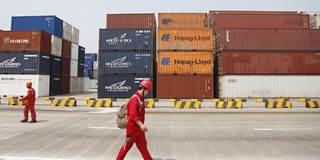Barry Eichengreen
Says More…
This week, Project Syndicate catches up with Barry Eichengreen, Professor of Economics at the University of California, Berkeley, and author of The Populist Temptation: Economic Grievance and Political Reaction in the Modern Era.
Project Syndicate: GDP growth in the US slowed to 2.1% in the second quarter of 2019, down significantly from 3.2% in the first quarter. After 121 consecutive months of expansion (as of July), a US recession, regardless of what caused it, would have serious consequences for emerging economies. What steps can they take to minimize the impact?
Barry Eichengreen: The World Bank’s Poonam Gupta and I recently examined every significant correction (including sharply weakening exchange rates) that emerging markets as a group have suffered since 2000. Every such episode – with the exception of the global financial crisis of 2008-2009 – was associated with financial tightening and/or an economic slowdown, mainly in the US. Now, another such slowdown appears to be coming (financial tightening, not so much).
What can emerging markets do? Use their own monetary and fiscal policies in countercyclical ways. Some countries (China, South Korea) have already done this, but others have not.
Eichengreen recommends
We ask all our Say More contributors to tell our readers about a few books that have impressed them recently. Here are Eichengreen's picks:
-

Eric Hobsbawm: A Life in History
by Richard Evans
Currently, I’m reading Evans’ biography of the great historian of the modern economy Eric Hobsbawm. Readers learn about the evolution of scholarship on the Industrial Revolution, globalization, and imperialism over the course of the twentieth century, while following Hobsbawm’s remarkable personal and intellectual journey.
-

Democracy and Dictatorship in Europe
by Sheri Berman
Berman’s book is a magisterial survey of Europe’s political development since the ancien régime. Necessarily, it’s an economic history and a political history.
-

The Struggle to Save the Soviet Economy: Mikhail Gorbachev and the Collapse of the USSR
by Chris Miller
Miller’s analysis is deeply grounded in archival material, but his account is short and accessible.
From the PS Archive
From 2018
Following the election of Brazil’s President Jair Bolsonaro, Eichengreen predicted that supporters of authoritarian politicians like Bolsonaro and Trump will learn the hard way that political corruption only grows worse under strongman rule. Read his commentary.
From 2017
Contrary to popular belief, Eichengreen argued, automation will cause many jobs to be transformed, not eliminated – a trend that places a premium on lifelong learning. Read his commentary.
Around the web
Trade agreements are shaped by both economics and geopolitics. Given this, Eichengreen and his co-authors recently cautioned, if the US alienates its geopolitical allies, successful bilateral agreements will be a lot harder to conclude. Read more here.
Speaking at the 2018 Nobel Symposium on Money and Banking, Eichengreen identified crucial lessons not just from the 2008 global economic crisis, but also from those that preceded it. Watch his presentation here.
A century after the Treaty of Versailles ended World War I, Eichengreen warned that the victors’ subsequent inward turn – the reason for its utter failure – has disturbing parallels today. Read more here.
